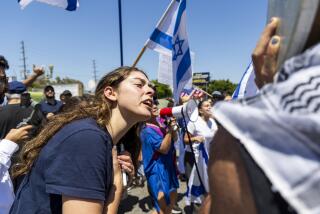Muslims, Jews Join to Honor Abraham
- Share via
On one of Islam’s most important holidays, a day dedicated to the remembrance of Abraham, Los Angeles Muslims and Jews met Friday and reminded themselves of their common patriarch.
With 45 members in tow, Rabbi Harold Schulweis of Valley Beth Shalom journeyed from Encino and crossed mountains, literal and otherwise, to meet with the Muslims of King Fahd Mosque in Culver City. For many from Schulweis’ Conservative congregation, it was their first visit to a mosque prayer service--yet, they said, it somehow seemed familiar.
Judy Geller noticed the absence of statues and pictures; Judaism and Islam shy away from what the Bible calls graven images. Others noted the physical separation of men and women, also common to Orthodox Judaism. Schulweis, half-jokingly, noticed the collection boxes.
And there was Abraham, the common patriarch--who was the subject of Imam Tajuddin Shuaib’s Friday sermon and is praised in calligraphy adorning the mosque’s domed hall. Shuaib spoke about Abraham’s willingness to sacrifice a son until God lifted the command. That event was celebrated Friday by Muslims worldwide during the start of the three-day festival Eid ul-Adha, marking the end of the hajj--the pilgrimage to Mecca.
“There is the shock of recognition that we have common roots and desires,” said Schulweis.
The trip to the mosque was the rabbi’s first foray into the sometimes prickly arena of Muslim-Jewish relations. One of the Southland’s most influential rabbis, Schulweis broke ground more than three decades ago in nurturing Jewish-Catholic ties. Cardinal Roger M. Mahony’s two visits to his synagogue several years ago, he said, startled Catholics and Jews.
Now, Schulweis said, it was time to reach out to Muslims.
Groundwork for the trip was laid last fall, when Schulweis invited Nazir Khaja of the Islamic Information Service to speak on Islam as part of the synagogue’s lecture series on world religions. The lecture, delivered two months after the Sept. 11 terrorist attacks, drew 2,200 people, the largest crowd of the series.
In return, Khaja arranged the reciprocal visit to the King Fahd Mosque, which the Jewish Defense League allegedly sought to bomb last year.
Because of such threats and the chill American Muslims have felt since the terrorism attacks, Khaja said, Muslims have “begun to see we need to reach out and grasp the hands of friends. This is the need of the hour and the dictates of our faith.”
To build on Friday’s exchange, the rabbi suggested that his synagogue’s havurah, or groups of families, invite Muslims into their homes to share food, holidays and friendships.
“If there is no dialogue, there is a terrible silence, and that often leads to dislike, contempt and sometimes violence,” Schulweis said.
On Friday, there was no lack of dialogue as several of his female congregants clustered around their Muslim counterparts and peppered them with questions.
Do you take your scarves off outside the mosque? Do Muslims embrace converts? Do you believe in a day of judgment? Do you tithe?
As one of the Muslims explained that those who wrong someone must ask their forgiveness, the Jewish women nodded. “That’s the same in Judaism,” one said.
“We are people of the book, so we are your cousins, your family,” a female mosque elder said with a smile. “So get to know us, and we will get to know you.”
More to Read
Sign up for Essential California
The most important California stories and recommendations in your inbox every morning.
You may occasionally receive promotional content from the Los Angeles Times.














